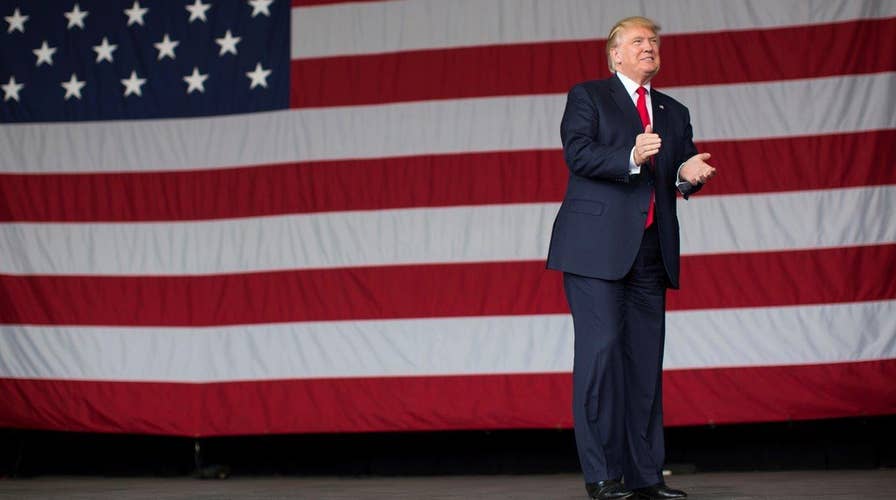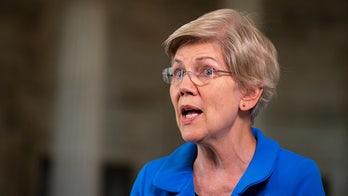Trump: Hillary's White House run is proof system's rigged
Republican presidential nominee stumps in St. Augustine, Florida
Amid claims from both presidential campaigns of election interference, an international agency is planning to dramatically expand the number of observers deployed to U.S. polling locations – though they’ve had to scale back their original game plan since some states won’t allow the foreign poll watchers.
The Organization for Security and Cooperation in Europe, or OSCE, originally announced it would send 100 long-term election observers “to follow the electoral process countrywide” and 400 short-term observers “to follow election day proceedings.” The 500 observers would mark a tenfold increase from 2012, when the group had just 44 observers in the United States. The OSCE is better known for sending observers into countries where democracy seems shaky, such as Ukraine.
The move comes as Republican presidential nominee Donald Trump has warned about a “rigged” election, and called for his supporters to act as citizen election observers as well. Democratic nominee Hillary Clinton, and Obama administration officials, have said the Russian government is attempting to influence the U.S. election.
The OSCE says it has made its deployment decision independent of this year’s campaign rhetoric. Further, the OSCE has had to reduce its planned observer force in recent weeks – given that a dozen states prohibit international observers, while seven states and the District of Columbia explicitly allow them. Most other states allow counties to make interpretations.
“The decision to send observers or not depends on the participating states,” said Thomas Rymer, spokesman for the OSCE’s Office of Democratic Institutions and Human Rights.
Whether the observer presence will lead to tensions at poll sites remains to be seen. But Kay Stimson, spokeswoman for the National Association of Secretaries of State, the group representing chief state election officials, said they’ve been coached on following the law.
“The flashpoint in past cycles has been attempts by international observers to enter polling places or maintain a presence near voting sites in states where such missions are not authorized or permitted by state law,” she said. “We’ve provided the OSCE mission leaders with information on the states in this camp, so now it’s up to them to abide by the law while they’re in the U.S.”
While the exact reduction in short-term observers is not yet determined, the international body reduced the number of long-term observers from 100 to 26, Stimson said.
“I don’t know what the actual difference will be -- they haven’t shared final numbers with us. We hope to know more soon,” Stimson told FoxNews.com. “I haven’t heard of any secretaries of state that are put off by the size of the mission.”
Even if the OSCE slashed the number of short-term observers by three-quarters, as it has the long-term observers, that would still total 126, nearly triple the number of observers in 2012.
International observers have no legal authority under any international law, and can only observe and report their findings.
The dramatic increase from 2012 to 2016 didn’t happen because of anything Trump has said or because of a request from activists, said Rymer, the OSCE spokesman.
“The increase in the number of observers is the result of the recommendation to include short-term observers, to observe proceedings in polling stations on elections more closely,” Rymer told FoxNews.com.
As for concerns about Russian interference, Rymer said: “The Russian authorities have publicly announced that they will not be sending observers as part of the ODIHR mission. There will be one Russian citizen observing, who is a staff member at our offices in Warsaw.”
According to The Associated Press, Texas, Oklahoma and Louisiana have separately denied a request for Russian officials to be at polling stations. These states specifically prohibit any election observers -- as do Alabama, Alaska, Arizona, Arkansas, Connecticut, Florida, Mississippi, Ohio and Tennessee.
According to the National Conference of State Legislatures, the states that allow international election observers are: California, Hawaii, Missouri, North Dakota, New Mexico, South Dakota, Virginia and the District of Columbia.
The Leadership Conference of Civil and Human Rights actually asked for more observers than planned in an August letter.
“The need for additional election observers is paramount,” the letter said. “The unprecedented weakening of the Voting Rights Act has led to a tidal wave of voter discrimination efforts nationwide and has required the United States to drastically scale back its own election monitoring program.”
The letter singled out several states for allegedly having “enhanced voter intimidation efforts.” It also took a swipe at Trump, saying he's “urged supporters to challenge voters at polling sites nationwide.”
Three of the states singled out by the civil rights group -- Alabama, Arizona and Texas -- prohibit international election observers.
“Our law ... prevents anybody from observing elections who is not a resident of Alabama,” Alabama Secretary of State John Merrill told FoxNews.com.
Merrill has no philosophical gripe with international observers, as he traveled to Russia to work as one earlier this year and doesn’t anticipate mischief from observers coming to other U.S. states.
“We were properly instructed in Moscow,” Merrill said. “If you don’t act right, you’re playing with fire.”





